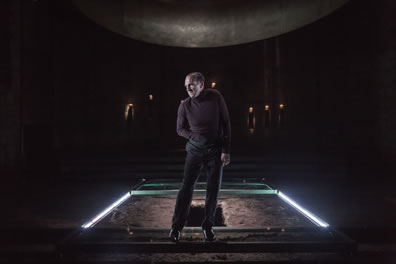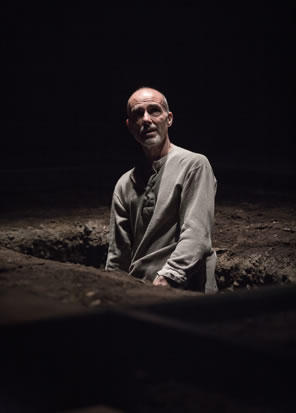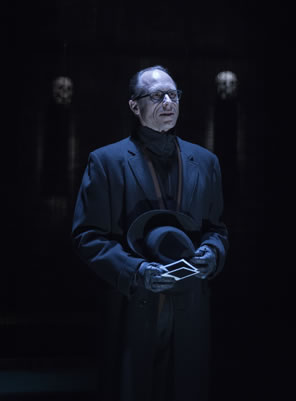Richard III
Grave Consequences
Almeida Theatre Live, Folger Theatre, Washington, D.C.
Monday, August 29, 2016, P–18&20 (front row balcony)
Directed by Rupert Goold

Richard (Ralph Fiennes) stands in front of the grave that will hold his body for five centuries in the Almeida Theatre production of William Shakespeare's Richard III. Director Rupert Goold uses the discovery of Richard's grave as a framework for his political parable. Photo by Marc Brenner, Almeida Theatre.
Appreciating William Shakespeare’s works over time—ours and the world’s—is all about shifting perspective. We age. Society evolves. All the while, Shakespeare’s incredible insight into the human psyche continues on an unbroken timeline of truth, which we appreciate more keenly as our own timelines oscillate onward.
I don’t recall ever feeling that more profoundly than when watching the Almeida Theatre’s production of Richard III starring Ralph Fiennes in the title role. Viewing a screening of this Almeida Theatre Live broadcast at the Folger Theatre, I saw clarity into Donald Trump, Brexit, nationalistic fervor, and the evil in our very midst—maybe, even, within ourselves (is complacency evil? To the 11 million victims of the Nazi Holocaust, the answer would be yes).
Certainly, the perspective of a production’s director has much to do with shaping our reaction to a play, and Rupert Goold, artistic director of London’s Almeida Theatre, warps this work in ways that bend Shakespeare’s truth. Most notably, Goold weakens the women in the play to heighten Richard’s prevailing misogynist attitudes, heightened in this production to the point of committing rape on stage. Nevertheless, much of Goold’s psychosocial emphasis is textual, and he uses a poignant device to illustrate how past is present and how the past could, consequently, be in our future.
That device is the discovery of the real Richard III’s body buried under what is now a car park in Leicester. Building a production around this 2013 news event has almost become clichéd, but Goold uses this framework to integrate Shakespeare’s depiction of the last of the Plantagenet kings into current events. When the body of Richard was found, Goold’s staging hints, it’s as if his soul was also unleashed on an unsuspecting world.
The production opens with archaeologists investigating the grave as we hear a newscast of the event. The archaeologists pull out pieces of the skeleton: a hand, the awkwardly bent spine, the skull. One scientist ponders the skull with fascination, not unlike the famous image of Hamlet with Yorick. My impression is that this scientist is played by Fiennes; he’s wearing a surgical mask and cap, so I’m not certain, but Fiennes’ distinctive eyes look like those of this particular scientist. Meanwhile, behind him, a similarly masked scientist looks like Aislín McGuckin, who will play Queen Elizabeth. If the scientist is Fiennes, he changes quickly to reemerge as Richard for the play’s opening soliloquy. However, I pick up other moments of editing in this broadcast, and that could be the case here (my main criticism of this, Almeida Theater’s first cinemacast, is that though you see the audience at the start and end of each half as well as in one scene of particular importance, it plays more like a lethargically paced BBC studio production, with extreme closeups, character reaction shots, and too-quick transitions between some scenes suggesting an edited product). I share my speculation that the two scientists are the play’s principal characters for what I feel are apt thematic ramifications of such staging.
The grave remains ever present on the stage (Hildegard Bechtler, set designer), visible under a glass floor but made accessible for three deaths. Rivers (Joseph Arkley) falls into the grave after being shot by a firing squad. Buckingham (Finbar Lynch) kneels by the grave and falls in as Catesby (Daniel Cerqueira) shoots him with a pistol, Mafia execution style. Finally, Richard already is standing in the grave as a half dozen of Richmond’s troops poke him thoroughly with their pikes. Meanwhile, with each murder conspiracy Richard concludes, a skull shows up in a nook of a stone wall behind a golden throne at the back of the stage.
Past and present are linked via other staging devices, too. The nattily suited Hastings (James Garnon) has his nose constantly hovering over his mobile phone. After his release from the Tower in the first scene, he’s busily scrolling his device’s screen, prompting Richard to ask, per the text, “What news abroad?” Hastings then reads on his screen how “the king is sickly, weak and melancholy, and his physicians fear him mightily.” Similarly, Hastings later receives a text from Stanley (rather than a messenger) warning him of the boar and the double councils; Hastings texts his reply. Both of these moments earn laughs, but Hastings serves as a modern parable in the way he's always buried in his texts, tweets, and other Internet matter instead of noticing the lethal web being spun around him, leading to Catsby chopping off his head at the council table.
Costuming by Jon Morrell crosses time, too. The suits and dresses are modernish, especially Hastings’, but at times they have a 1960s look, at other times a 1930s aesthete, though Queen Margaret (Vanessa Redgrave), looks like a Welsh coal miner in oversized, dirty industrial coveralls. Gradually, the play's look goes further back in time. Weaponry early in the play is rifles and pistols, and Richard’s scabbard is a knife sheathed in his cane. However, in the last act, medieval accoutrements gradually show up: Richmond (Tom Canton) is wearing a chainmail collar in one scene, and the next time we see him he has armor covering one arm; by the Battle of Bosworth Field, both he, Richard, and their soldiers are fully armored and using swords and pikes.
Fiennes brings his trademark intensity to playing Richard, as physical a performance of the role as I’ve seen since Antony Sher’s double-crutches “bottled spider” for the Royal Shakespeare Company in 1985. With bent posture Fiennes scampers about the stage with nervous energy. At the council where he turns on Hastings, he reveals a grotesquely withered hand, and later with his coat off, he turns his back on the audience and we can see his curved spine poking through his tight shirt; it looks just like the twisted spine we saw the archaeologists extract from the grave. Other than these moments, however, Fiennes focuses more on portraying with sublime physicality the psychological toll of dealing with ever-present physical pain.
Fiennes makes clear to the audience from the opening soliloquy that he’s a psychopath. His final soliloquy comes across as schizophrenic. But throughout, he’s as much a comedian as he is a villain. His snide remarks delivered with a knowing wink are a big part of his attractiveness. I likely always will contend that Richard is best appreciated only in the context of his earlier development as a character in Henry VI, Parts Two and Three, and Goold does incorporate some lines from those prequels into this production (most notably, Richard’s “Why, I can smile, and murder whiles I smile”). However, Richard’s purpose in this production is not as a study in personality disorder but as a study in a social order methodically dismantled by a powerfully influential but disingenuous politician.
Richard's arc of lies is most pronounced in Fiennes’s performance. In the first half of the play, we see him blatantly fib with alacrity to his brother, Hastings, Lady Anne, his nephews, and the rest of the court. In the second half, he continues lying but has increasing trouble navigating credibly through truth. When he’s courting Elizabeth to marry her daughter, his purposes are blatantly transparent despite his bathing them in a succession of ridiculous logical arguments, and you can see that he believes himself to be pulling off the ruse. But he’s not, to us or to Elizabeth, and his frustration increases, and with it his credibility sinks further. In the end, with his final soliloquy, he realizes he isn’t even credible to himself.
At that point, another textually based thematic undercurrent of this production surfaces: nationalistic elitism. I never noticed before the xenophobia in Richard’s pep talk to his troops. “Remember whom you are to cope withal: a sort of vagabonds, rascals, and runaways, a scum of Bretons and base lackey peasants whom their o’er-cloyèd country vomits forth.” He goes on to describe how these non-natives will “bring you unrest,” “restrain” property and “distain” wives. “And who doth lead them but a paltry fellow,” he says. If this sounds naggingly familiar outside the play itself, remember that in America, the line between "antimulticulturalism" and the Ku Klux Klan is a hood.
The production explores elitist attitudes more through the character of Buckingham than Richard. Lynch’s Buckingham takes to heart his heritage as one of “the mighty dukes”—Richard, then Duke of Gloucester, is the other so described. The factions of the court are those who have a long lineage of landed nobility versus the commoner queen and her family. Richard stirs this dissension with his not-so-subtle stabs at Elizabeth’s lack of royal blood, and it serves as Buckingham’s motivation for allying himself with his fellow “mighty duke” in a play for the throne. Buckingham could even buy into the definition of the Prince of Wales and his brother as bastards because they have Muggle blood, being the sons of King Edward by commoner Elizabeth. For his efforts, Buckingham latches on to a promise of gaining more wealth and power. What Buckingham doesn’t see through until he balks at killing the princes in the Tower is how Richard's elitist pronouncements are totally for his own self-advancement.
This production shows the extreme consequences of personality cults and the fascism that inevitably arises from them. How does someone of Richard’s obvious duplicity escape greater scrutiny and even generate an avid following? He does so through a mix of brash, belittling attitude and feigned shows of humility and religious devotion; through this combination he gains a circle of power-seeking enablers while winning over the unquestioning masses. For the hold-outs he uses the "when you get to really know me" argument and warns of a nation otherwise heading for ruin: "Plead what I will be, not what I have been: Not my deserts, but what I will deserve. Urge the necessity and state of times, and be not peevish found in great designs."


Buckingham (Finbar Lynch, top) digs his own grave, and Tyrrell (David Annen) revels in killing the princes in the Almeida Production of William Shakespeare's Richard III. Photos by Marc Brenner, Almeida Theatre.
Meanwhile, nobody listens to Margaret. Well, she’s crazy, right? Not so in Redgrave’s performance, though she is carrying a baby doll around with her. Her prophecies all come true, and it is not some insanity-inspired seer power she harnesses; it’s simply forecasting into the future her past experience with Richard (Shakespeare didn't see her as an angry witch as many directors and actresses want to portray her; again, the context of the Henry VI prequels is crucial in fully appreciating the character of Margaret). Nobody believes Margaret until they are about to be shot, raped, or chopped off at the neck: only then do they fully grasp the real truth of Richard’s being (watching these moments in this production remind me of the post-Brexit interviews I heard in which many who voted for the UK’s leaving the European Union realized too late how little stock they put in media fact-checkers). Elizabeth, too, knows the truth of Richard, but she has three strikes against her: one, she is vying with him for power in the court; two, her family was, as Richard rightly points out, on the wrong side at the start of the Wars of the Roses; and three, she’s a woman.
Fiennes’s Richard is unabashedly sexist. He doesn’t just belittle women and treat them as matter for only the heart and bed, he also physically attacks their sexuality. Anne (Joanna Vanderham) is in full-throated curse mode before Richard even shows up, and she maintains this mode of expression throughout all her appearances. However, in courting her, Richard first nibbles at her moral conscience, then nibbles on her lip, and finally grabs her crotch. This puts her in a state of fright where she sees her only viable response is to answer in kind, with her own sexual power. Richard, of course, is dismissive of such power (obvious in Fiennes’s ridiculing tone delivering his “was ever woman in this humor wooed?” soliloquy). Richard is even more sexually violent with Elizabeth: when he can’t verbally convince her to court her daughter for him, he rapes her, and she, seemingly, gives in. This production ends with Richmond’s benediction that “peace lives again: that she may long live here, God say ‘Amen’!” and the four women, strolling around the grave, repeating “Amen” (not textual) as the archaeologists return to the gravesite.
As apt as this may be for Goold’s thematic purposes, it departs from Shakespeare’s depiction of the women, especially the strong-minded and strong-willed Margaret and Elizabeth. Nothing in the text even suggests that Richard rapes Elizabeth (rather, he threatens the nation's destruction if she does not assist him). Nor does the text have her giving in at the end of Richard’s courtship scene with her; rather, she only promises to inform him further, and we hear later that she has consented to match her daughter with Richmond, a piece of text cut from this production. Being non-Shakespearean, this aspect of the production not only undermines its overall thematic thrusts, it undermines McGuckin's strong and savvy portrayal of Elizabeth as a strong-willed and devoted queen made a victim by forces beyond her control (but, textually, able to successfully fight back in the end).
Richard’s world (and most productions of this play) is divided at the point he becomes king. It is the moment that the master manipulator gradually begins losing control of his crowd. This moment in this production has broader ramifications for modern audiences. Richard starts the play complaining in his “winter of discontent” soliloquy how “I, in this weak piping time of peace, have no delight to pass away the time.” A new piping time of peace has come: he is king, he achieved his long-held goal, so now what? Slumped in boredom on the throne, hanging his crown on the seat back, Fiennes’s Richard looks for more trouble to keep him occupied and his kingdom’s attention on him, even if that means spurring armed revolt: kill the princes in the Tower, kill off his wife, and marry his niece.
Tyrrel, the murderer that Richard hires to off the princes, is the production’s most discomforting character on many levels. First, Richard seeks him in the audience. “Is thy name Tyrrel?” Fiennes asks, standing at the front of the stage, repeating the query as he looks directly at members of the audience. Among the cinema audience at the Folger you can hear titters—there’s a humorous innocence in Fiennes’s delivery—but you also sense that the Almeida audience is not at all comfortable, especially when on the fourth query, a man, standing in the aisle, answers, “James Tyrrell, and your most obedient subject.” David Annen is not the typical Tyrrel of Richard III productions I’ve seen; instead, he’s typical us. Dressed in a nice, off-the-rack suit and overcoat, he could be the village shopkeeper, your office’s accountant, a Wal-Mart greeter. He also is, apparently, a sadistic pedophile. He holds two Polaroid prints in his gloved hands as he describes the murders he’s just committed, lingering on how the boys’ “lips were four red roses on a stalk, and in their summer beauty kissed each other.” As Tyrrell speaks, the two boys appear sitting in the throne behind a chain curtain; the lights on them go out, and when they come back up, Richard is sitting there and addresses Tyrrell. "Kind Tyrrell, am I happy in thy news?"
It is a deeply disturbing image. Having in my newspaper days written a series of in-depth stories on pedophilia and law enforcement officials’ difficulty combating the crime, I can tell you that this is the character that strikes the greatest fear in many parents, not to mention victims and potential victims. Part of what makes the pedophile so frightening is that he or she exists, invisibly, among us, using the cloak of trust and unquestioning ignorance to remain hidden. However, within us is another evil, perhaps more far-reaching as it applies to politicians as well as pedophiles; it’s our disposition to ignore the truth, especially when we have a selfish stake in doing so. When we do, reality will be our grave.
Eric Minton
September 17, 2016
Comment: e-mail editorial@shakespeareances.com
Start a discussion in the Bardroom



 Find additional Shakespeareances
Find additional Shakespeareances